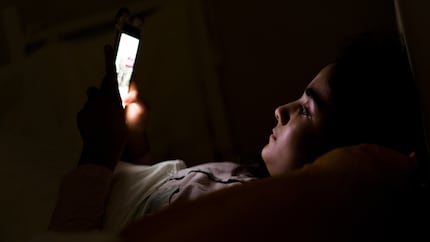
OECD study: This is the online life of children and young people
What does the online life of children and young people look like - and how are they doing with it? The latest OECD report provides an overview. 15-year-olds from Switzerland are less online in their free time than their peers from Germany and Austria.
Screen time is an irritant in almost all families. At the latest when children become teenagers, parents lose track of what their offspring are doing online. Studying or playing games? Dating or bullying? Anything is possible. Not everything comes to light. The Organisation for Economic Co-operation and Development (OECD) is trying to keep track of everything using data. And to find out how the children are doing with it.
At the age of 10, an OECD average of around 70 per cent have their own smartphone; by the age of 15, almost everyone is equipped with one or more digital devices. In the affluent countries of the 38 member states, which also include Germany, Austria and Switzerland, they are a constant companion for young people from all walks of life. On average, 15-year-olds use them for over 30 hours a week.
For school, when studying and, of course, in their free time. An average that many teenagers in the DACH countries clearly exceed: In Switzerland, just under half spend 40 hours or more in front of a screen, in Austria the figure is over 50 per cent and Germany is heading for 60 per cent.
More than two hours a day online in leisure time
When it comes to gaming, chatting and posting, there are differences. While just under 60 per cent of Swiss teenagers say they spend more than the recommended two hours online in their free time on a school day, this figure is as high as 70 per cent in Austria and around 75 per cent of 15-year-olds in Germany.
The higher the level of socialising, the higher the proportion.
The higher the social class, the longer young people tend to be online. This factor is less significant in Switzerland, where the gap is not wide. At weekends, the figures shoot up in all countries - this is also when Swiss teens overtake their Austrian peers.

Source: Shutterstock/BearFotos
What are they doing?
Having fun, of course! Mainly through aimless browsing, social media, chats or games. Almost 70 per cent create and post their own content. Swiss and Austrian young people are slightly more active than their peers in Germany, where they game more.
Girls get upset about inappropriate and discriminatory content much more often than boys. They are also more affected by unfriendly and offensive messages. Interestingly, German young people are the most relaxed about these unwanted messages of all OECD countries. In Switzerland and Austria, they affect boys and girls almost equally, while in almost all other countries, girls have greater problems with them.
How are they doing with it?
It doesn't always stop at an unkind message. A sad trend in cyberbullying can be seen in comparison to previously collected data. In almost all OECD countries, the problem increased between 2018 and 2022 - and it starts at primary school age. Between 10 and 15 per cent of 11 to 15-year-olds have already been victims. Slightly fewer in Switzerland than in Austria and Germany.
In general, the mental health of young people has deteriorated in recent years, according to the OECD. According to the study, girls are more affected by depression, anxiety, problems with their own body image and similar issues - social media is also more of a problem for them than for boys.

Source: Shutterstock/banu sevim
Almost always on reception
In general, 13-year-olds of all genders rate their social media consumption as problematic more often than 15-year-olds. Either they take their parents' warnings even more seriously at 13. Or they find a better way of dealing with it. In any case, two years later they no longer see it as such a big problem. They are almost always on reception anyway.
Almost half of the OECD average do not switch off their notifications even during lessons. For once, Germans are among the leading nations (between 30 and 40 per cent, depending on social class) and are slightly more disciplined than their peers in Switzerland; in Austria, every second message gets through. In the evening before going to bed, the order is reversed again, with girls more likely to make sure that it has to end at some point.
Nervous without a smartphone? Not in Switzerland
It is particularly unfavourable when children and young people have their smartphone with them at all times. Even in the evening, in their own room. That's what the study says and most parents would probably agree. Sleep suffers, children are tired the next day - and as a result, they prefer to hang out in front of the screen again. How the young people react to the withdrawal was also recorded as part of the report.
Young Swiss people remain largely relaxed. Many in Germany and Austria are also taking it in their stride. Surprisingly, Turkish young people are particularly nervous - even though most of them didn't get their smartphone so young in Turkey.
Simple writer and dad of two who likes to be on the move, wading through everyday family life. Juggling several balls, I'll occasionally drop one. It could be a ball, or a remark. Or both.
From the latest iPhone to the return of 80s fashion. The editorial team will help you make sense of it all.
Show all